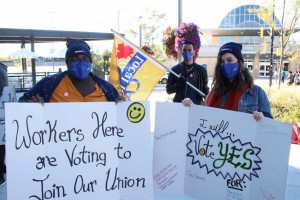
Hailey King
It's hard to imagine, but a significant public policy campaign launched by retail workers in Canada began with the pages of the right-leaning Toronto Sun newspaper. "I was on the TTC and happened to pick up a copy of the Sun, off the floor. I hate the Sun, but there was nothing else to read," recalls Ian Cameron of one of his morning commutes to the Metro supermarket, where he works.
"It was just a small news story, just a passing reference, actually, that Toronto city council was considering a proposal that would allow retailers to open their shops 365 days a year, including on statutory holidays," says Cameron, a member of the Canadian Auto Workers Local 414 (now Unifor Local 414), and an elected Toronto-area union chairperson. He couldn't believe what he was reading. Raising his voice, he says, "We've got single parents in our stores working multiple jobs, most at minimum wage, and they still can't afford to live in this city. And our local businesses and politicians were considering a proposal that would make it harder for them to spend time with their family." Shaking his head in disbelief, he offers a wry smile and says, "They assumed we wouldn't notice, or that maybe we wouldn't care. Boy, did we show them."
Sitting in her office at the union hall in Milton, Ontario, the local's president, Christine Connor, reflects on the drastic workplace changes retail workers faced in the 1980s and 1990s. "I remember a time when there were about the same number of full-time workers in our stores as there were part-time workers, and everyone was well paid. Those days seem a distant memory now."
PRECARITY FRUSTRATING THE FIGHT
According to Connor, today more than 75 per cent of supermarket jobs are part time, and wages for most of the workers have not kept up with the rate of inflation. They're not even close. The real (inflation-adjusted) wage for Canada's supermarket workers has been in decline for the past two decades. Between 1991 and 2010, real hourly wages have fallen by 22 per cent (from $17.11 to $13.33).
Connor believes the erosion of pay and the quality of jobs in the retail sector -- the precariousness -- helped undermine retail workers' ability to fight against the steady expansion of store operating hours in the 1990s. The background actions to the expansion included the Ontario government's decision to loosen Sunday shopping laws, and retailers opting to extend shopping hours across towns and cities (in some cases moving to 24-hour operations). These changes seemed to move in lockstep with weaker oversight and a lack of enforcement of penalties imposed on retailers who knowingly broke holiday shopping laws.

Ian Cameron
"Too many retail workers have been pushed into the ranks of the working poor," says Connor. "It's hard to work full-time hours at minimum wage and still make ends meet. And since full-time jobs are becoming rarer, it's no surprise workers are willing to take on a night shift or a Sunday shift to help earn some extra money. They don't have a choice. And their personal lives are suffering as a result. This is the downward spiral retail workers have been experiencing for decades."
PROFITS OUTWEIGH PENALTIES
In 2006, a landmark piece of legislation bestowing extraordinary powers on the City of Toronto worked its way through the halls of Queen's Park (Ontario's provincial parliament). The new City of Toronto Act would enable municipal councillors to establish new revenue-raising tools and enact a set of "made-in-Toronto" bylaws that met specific citywide interests. It was during this period that the city put in place Municipal Code Chapter 510, a temporary bylaw that governed holiday shopping. When introduced, Chapter 510 mirrored existing requirements set out in the province's Retail Business Holiday Act, obligating most businesses to close up shop on nine identified holidays throughout the year: New Year's Day, Family Day, Good Friday, Easter Sunday, Victoria Day, Canada Day, Labour Day, Thanksgiving Day and Christmas Day.
The Act (and Chapter 510) granted certain retail stores exemptions from holiday shopping rules, including stores located in designated tourist zones, such as Toronto's Eaton Centre and the Distillery District. Pharmacies are also exempt from current rules, but only those with less than 7,500 square feet of retail space. Gas stations and nurseries under 2,400 square feet are also exempted. So are art galleries. Certain municipal councils in Southern Ontario have exempted their entire municipality from the Retail Business Holiday Act. Others diligently uphold the law.
Enforcement of these laws is lax, at best. Businesses are subject to a relatively modest $5,000 fine for breaking the rules and these fines are only imposed if someone initiates a complaint. Some retailers choose to open regardless of the rules, either because revenues outweigh the cost of the penalty, or because there is little chance anyone will complain.
Gord Currie, Unifor Local 414 vice-president, says there is a deep irony here that shouldn't be overlooked. "It was the retail business community that raised the issue of holiday shopping with city council, originally, claiming that rules weren't fair and created an uneven playing field. Yet it was the retail businesses themselves that created the confusion by advocating for more exemptions over time," he says.
CUT FROM THE CONVERSATION
Since 2006, Toronto city council had discussed the possibility of lifting holiday shopping rules. But it was only in 2010 when a concrete proposal finally came to a vote, recommending that the city eliminate the holiday shopping ban and allow stores to open, without penalty, 365 days a year. The vote prompted the news story in the Toronto Sun -- the same article Ian Cameron came across on his way to work in the fall of 2010. It was this article that prompted the CAW, along with other Toronto-area unions, worker advocacy organizations, and retail workers, to take action.
"I remember feeling totally outraged at the proposal and the fact that city retail workers were totally cut out of the conversation," says Sue Holdoway, a retail worker and Local 414 member who helped lead the union's campaign to preserve holiday shopping rules. "It's ridiculous, if you think about it," adds Philippe Lavoie, an 18-year-old front-end clerk, who supported the effort. "There are more than 400,000 retail workers in the city that would have been impacted by this decision. They're the ones that'll have to give up their long weekends, their family trips, their kids' hockey tournaments. Yet, no one thought it'd be wise to ask their opinion first before taking this to a vote."

Phillip Lavoie
Within 48 hours of learning about the council vote, the union circulated a letter from its national president, Ken Lewenza, to all 44 members of city council, expressing concern and frustration regarding the lack of direct worker input on the holiday shopping proposal. The letter encouraged the council not to move hastily with the proposal, and to consult with retail workers before any decision was reached. "It was an opposing point of view and definitely gave councillors some pause," says Cameron. Rather than vote on the motion, the council postponed the discussion pending a more thorough examination of the issue. This gave retail workers the time they needed to organize.
OFF THE MARK
The matter was deferred to Toronto's Economic Development Committee who, in turn, established a sub-committee on holiday shopping. This committee was charged with leading the public consultation process and conducting a thorough review of holiday shopping rules and opinions across the city.
The committee organized a series of meetings with key stakeholders, including representatives from CAW Local 414, the Toronto Workers' Action Centre, UFCW Canada (United Food and Commercial Workers union), the Toronto & York Region Labour Council, and other worker advocacy groups. These consultations were followed by a telephone poll, an online survey, and six town-hall meetings.
"We listened to the arguments being put forward by business-community representatives," says Connor, recalling the conversations that took place in the meeting rooms at City Hall. "They were telling us that workers actually wanted to work the extra holiday shifts because they wanted the extra cash. We said, 'Yes, these workers are underpaid. Yes, they would take more shifts. But removing guaranteed days off work wasn't the way to fix those problems.' We told them that for retail workers, lifting the holiday shopping ban is totally off the mark."
GRASSROOTS MASS ACTION
In a matter of weeks, the union had rounded up thousands of petitions opposing any change to holiday shopping rules for retail workers. The petitions had been circulated across the city in unionized retail workplaces, as well as non-union outlets like Tim Hortons, Canadian Tire and many other small and large shops. It was a grassroots mass-education and political-action effort led by retail workers themselves.
"Our team of campaigners went store to store, mall to mall, talking to thousands and thousands of fellow retail workers about the issue," says retail worker Yothikka Vethanayagam. "Very few had heard about it. The vast majority of them didn't even hesitate. Stripping away guaranteed time off was a non-starter, and they were prepared to speak out."
Teams of retail workers also participated in the town hall meetings, ensuring their concerns were heard loud and clear by councillors and city officials. Social media sites lit up with activity, including worker-to-worker discussions about holiday shopping. The constant presence of the workers themselves during the consultation process generated widespread media interest as well, with organizers fielding requests for interviews from both local and national news outlets, in both English and French. The story also carried itself across the border, into the U.S.

Yothikka Vethanayagam
"We had built a database of hundreds of members who wanted to participate in ongoing campaign activities," recalls Holdoway. "Members were asking us to call them at home to provide updates. They wanted to demonstrate; they wanted to write letters and call their councillors. It was like a pent-up frustration was being expressed through this one particular campaign: about the poor-quality work, the insecurity, the precariousness of retail work. It was impressive."
WORKERS AT THE MIKE
In the dying weeks of the consultation process, union-sponsored radio ads flooded the airwaves, broadcasting across major Toronto stations. At the same time, union organizers were coordinating newly active members to meet with their respective city councillors. Meetings were held with over half of city council. Many of the workers who participated in these lobby sessions had never taken part in a political action campaign before. Some later signed up to deliver personal deputations at Toronto's Economic Development Committee meeting.
Local 414 member Sevda Markovic was one of them. Originally from Yugoslavia, she said she never thought she would find herself at a microphone, speaking to city councillors on behalf of her co-workers. "It was a good feeling to be able to share my concerns, to have a say in government decisions that impact me. I spend my holidays enjoying time with my grandkids, telling stories about life in my homeland and teaching them lessons about the importance of work, but also the importance of having time to rest. I don't want that time taken away."
Following these deputations and the report of the holiday shopping subcommittee, Toronto's Economic Development Committee voted to take an amended proposal to city council. The proposal was to extend holiday shopping hours only on Victoria Day. That proposal was eventually overturned. Hearing the concerns of retail workers, councillors voted 37-6 in favour of keeping the status quo on holiday shopping laws. The dozens of workers in attendance cheered as the final vote was announced.
COUNTERING NEO-LIBERAL LOGIC
The Toronto holiday shopping campaign win was significant for reasons far beyond guaranteeing retail workers time off the job. It boldly countered the dominant neo-liberal logic of labour market "flexibility" (things don't get more "flexible" than having to work 365 days a year!)-- the same logic that defines the push for longer work hours and less pay. The campaign also properly situated the issue of work hours into the broader discussion of work quality and the need for good jobs. Retail workers in Toronto signalled that the fight for good jobs is not entirely defined by the fight for higher wages. If it was, then these predominantly minimum-wage earners (sub-minimum for those under the age of 18) would all have eagerly chosen to work on holidays, for the extra pay.
Instead, these retail workers transcended narrow self-interest. They managed to politicize the concept of work-life balance, turn it into an engagement tool, and mobilize thousands of fellow workers who, like them, are too often written off as too difficult to organize.
"There are increasingly more of us in retail than there are in any other sector in this country," says Cameron, noting the sharp rise in retail-trade jobs over the past decades. Retail is now Canada's largest single employment sector, with nearly 2 million workers (topping manufacturing and health care). "We can be a potent voice for workplace change, both at the bargaining table and politically. We just have to start working together, and we have to find ways of organizing on issues that matter to us."
Cameron points to worker-led campaigns to raise retail work standards sprouting up in cities all across the continent, including the unprecedented Wal-Mart worker-led strikes and protests taking place throughout the United States. He and his co-workers are not alone. "I know my co-workers were empowered by our win at City Hall. This campaign has reintroduced many of them to the power of collective action, and the power of the union. I feel that retail workers are waking up to the fact that workplace fairness and justice isn't handed to us -- we have to fight for it. And I believe many feel confident that if we fight, we'll win."
Angelo DiCaro is a national representative with Unifor.











